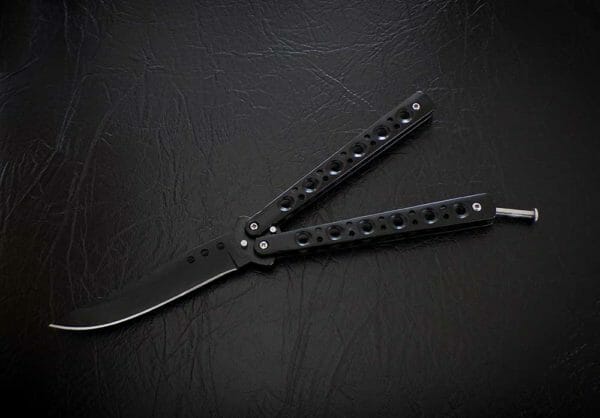
“Hawaii will get a chance to reinstate a ban on butterfly knives after the Ninth Circuit Court of Appeals agreed Thursday to review a decision that determined the weapons fall under Second Amendment protection,” Courthouse News Service reports. “The court voted to grant Hawaii’s request for an en banc rehearing of a conservative three-judge panel’s ruling in August 2023 that ended the state’s 30-year ban on butterfly knives…”
The case filed on behalf of plaintiffs James Grell and Andrew Teter, both adult male residents of Hawaii and citizens of the United States by attorneys Alan Beck and Stephen Stamboulieh, was reported on in April 2019 by AmmoLand Shooting Sports News.
It challenged the State of Hawaii’s ban on butterfly knives (or balisongs), knives “having a blade encased in a split handle that manually unfolds with hand or wrist action with the assistance of inertia, gravity or both.”
“Rather than ask, as Bruen and Alaniz require, whether butterfly knives were commonly used for self-defense, the panel instead asked whether Hawaii had proven that these weapons were not in common use for some lawful purpose,” the state charged in its petition.
First, we’re hardly talking about new technology. From Blade’s “History: The Disputed Origins of the Butterfly Knife“:
The Philippines is often cited as the birthplace of butterfly knives, where “balisong” is a more appropriate term. Legend has it that the balisong knife has roots that go back to around 800 AD. This style of knife could be opened quickly with one hand and easily used as a weapon. It proved a common choice for self-defense and utility uses… Another claim is that the butterfly knife was invented in France between 1500 and 1700. The reason for this is the “Pied Du Roi,” which means “foot of the king” and is a French measurement tool that dates to the 1700s. The “Pied Du Roi” greatly resembles a butterfly knife. This tool has been pictured with measurement handles and a blade that folds out on one end. It looks like a butterfly knife, but could it be considered the first one ever made?
“Common use,” as cited in Miller, applied to “the Militia comprised all males physically capable of acting in concert for the common defense. ‘A body of citizens enrolled for military discipline.’ And further, that ordinarily when called for service these men were expected to appear bearing arms supplied by themselves and of the kind in common use at the time.”
What that means, even if the government doesn’t want to admit it, is unless “in common use at the time” is held to mean by soldiers in the field, with real “weapons of war,” as opposed to a sporting arms popularity contest, the Second Amendment will be nullified as a last-resort defense against foreign and domestic tyranny. And if the sticking point here is knives that can be opened with one hand, consider the M-724, “the current issue and perhaps the most widely recognized switchblade knife in the world. It is still in use by US military pilots, paratroopers and rescue crews, as well as NATO forces around the world.”
Then again, we’re talking about the Ninth Circuit, which appears to be doing everything it can to keep the clock running in the hopes that Democrats will win the presidency in November and begin reshaping the Supreme Court to reverse its rulings on guns in Bruen and abortions in its overturning of Roe v Wade. We’re also talking about the state of Hawaii, which, along with being the most corrupt state in America, rivals them all in terms of being anti-gun.
The state Supreme Court is openly defying the U.S. Supreme Court by denying a citizen’s right to bear arms, citing, among other irrelevant, incompetent, and immaterial reasons, the legally undefinable and unenforceable term “spirit of Aloha.”
The court’s 53-page ruling said Hawaii’s history “does not include a society where armed people move about the community to possibly combat the deadly aims of others.”
“The spirit of Aloha clashes with a federally-mandated lifestyle that lets citizens walk around with deadly weapons during day-to-day activities,” the ruling said.
That ruling “harkened back to the Kingdom of Hawaii — which historically levied heavy regulations on weapons — while pushing back on the Second Amendment,” the Courthouse News Service report elaborated. “The spirit of Aloha clashes with a federally mandated lifestyle that lets citizens walk around with deadly weapons during day-to-day activities.”
If they’re intent on imposing primitive spiritualism on all, that’s a pretty clear violation of the First Amendment prohibition against the establishment of religion. As for relying on the “law” when Hawaii was a kingdom, first off, this nation was founded after throwing off the shackles of a king, and the Founders codified in the Constitution that “No Title of Nobility shall be granted by the United States: And no Person holding any Office of Profit or Trust under them, shall, without the Consent of the Congress, accept of any present, Emolument, Office, or Title, of any kind whatever, from any King, Prince, or foreign State.”
With the Bruen standard, we can look back to the time of ratification to confirm founding intent. History, tradition, and text become problematic with Hawaiian precedents, however, as they “had no written language prior to Western contact, except for petroglyph symbols.”
All other kinds of Bill of Rights protections would have to be given up as well, particularly the Eighth Amendment’s forbidding of “cruel and unusual punishment,” as the kapu tradition relied on it:
If a rule was broken or an offense was committed it was considered kapu and this was strictly enforced. The offender was often sentenced to death even if the kapu was committed unintentionally. Individuals within the community were assigned the role of ‘ilamuku—law enforcer—and were responsible for tracking down kapu breakers.
People were put to death by clubbing, stoning, strangulation, drowning, or burning. The system and its application were relentless. There was no questioning, trial, or compassion offered for offenders, they were immediately put to death. Often the accused would take their own life before the ‘ilamuku got to them.
And Hawaii AG Anne Lopez, a defendant/appellee in the butterfly knife case, and all the Demanding Moms who want you disarmed in the spirit of Aloha should keep in mind is that the most extreme kapu restrictions applied to women:
Ai kapu loosely translates to ‘sacred eating’ and it was strictly prohibited for men and women to eat together at any time.
Not only were women prohibited from dining with men, but what they were allowed to eat was regulated as well. The most sacred foods were off-limits to women. This prohibition included 67 of the 70 varieties of pork (who would have imagined there were that many), bananas, coconuts, taro, and certain fish.
As if declaring that women could not eat these delicious foods wasn’t bad enough, they weren’t even allowed to be a part of their preparation or in many cases even touch them. Women were also not permitted to enter the home while their husbands were eating. The system went even further, by prohibiting women from having anything to do with other applications of these foods. For example, they could not make or use coconut rope.
Otherwise, see the horrible execution methods above. And perhaps most unwoke of all, there were no provisions with these binary bigots for “identifying” as anything else and eating with the fellas.
We have two citizen disarmament cases wending their way through two courts, but they both rely on essentially the same thing: superstition relying on ancient barbaric belief systems that say the people exist to serve rulers rather than the government exists to serve the people.
It’s hard to see how continued open rebellion by inferior courts can continue to be tolerated, especially when the “legal” doctrines they rely on are so clearly political, un-American, offensive to freedom, and primitive.
“I am hopeful that the en banc panel will agree with the panel opinion’s well-reasoned opinion,” attorney Beck, speaking of the panel that determined Second Amendment protections apply to butterfly knives, tells AmmoLand News. “If not, then this case will be a good candidate for Supreme Court review.”
About David Codrea:
David Codrea is the winner of multiple journalist awards for investigating/defending the RKBA and a long-time gun owner rights advocate who defiantly challenges the folly of citizen disarmament. He blogs at “The War on Guns: Notes from the Resistance,” is a regularly featured contributor to Firearms News, and posts on Twitter: @dcodrea and Facebook.

from https://ift.tt/HWzQZeD
via IFTTT

No comments:
Post a Comment